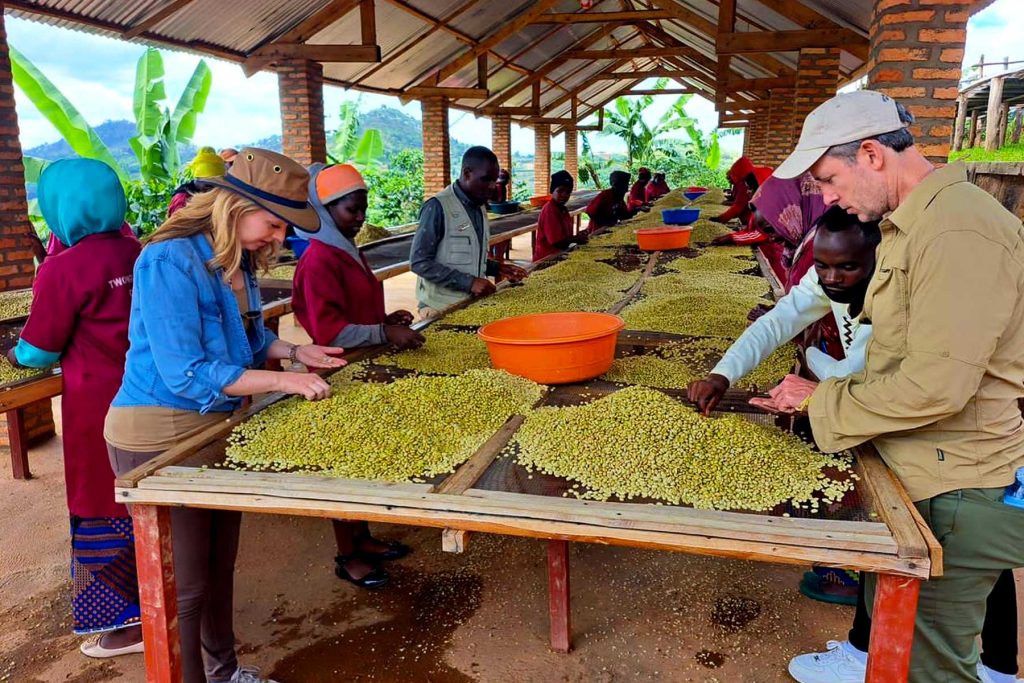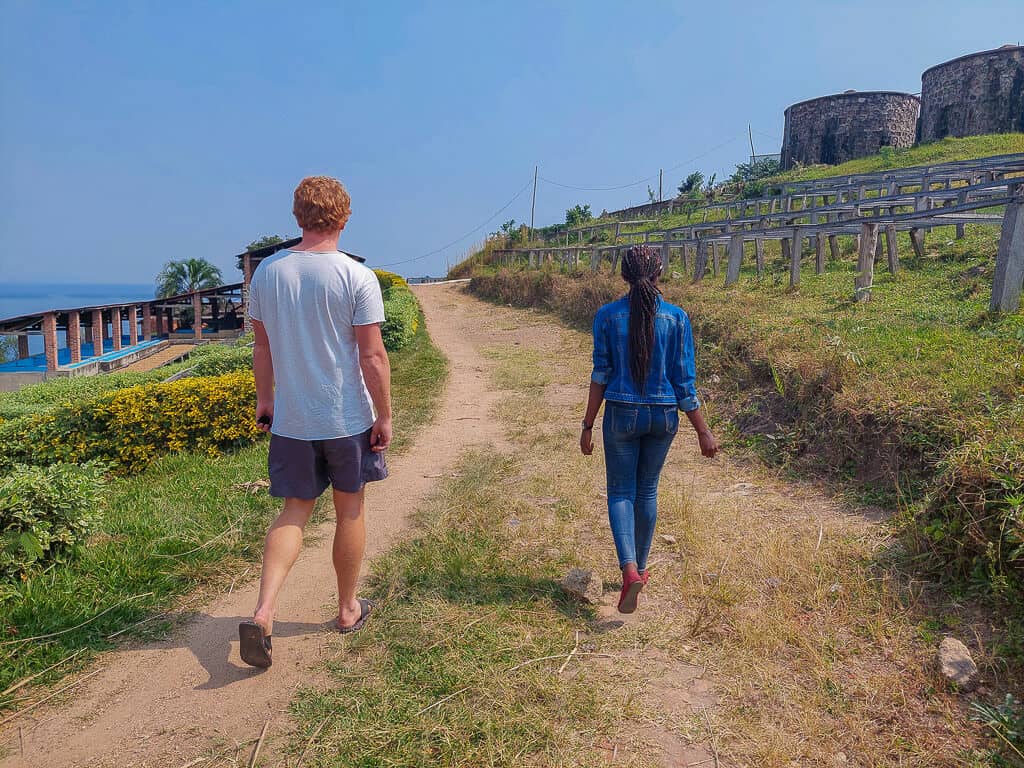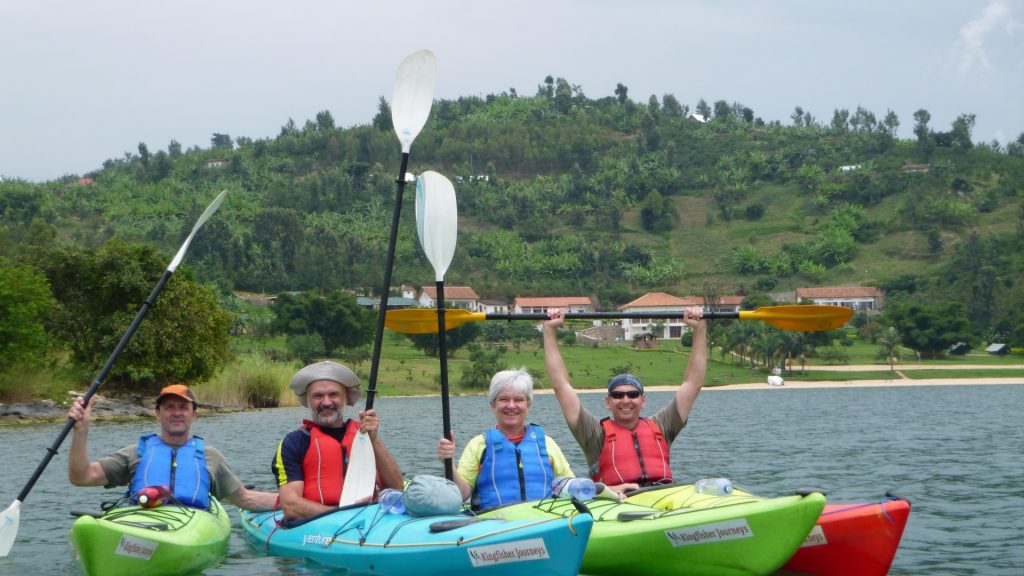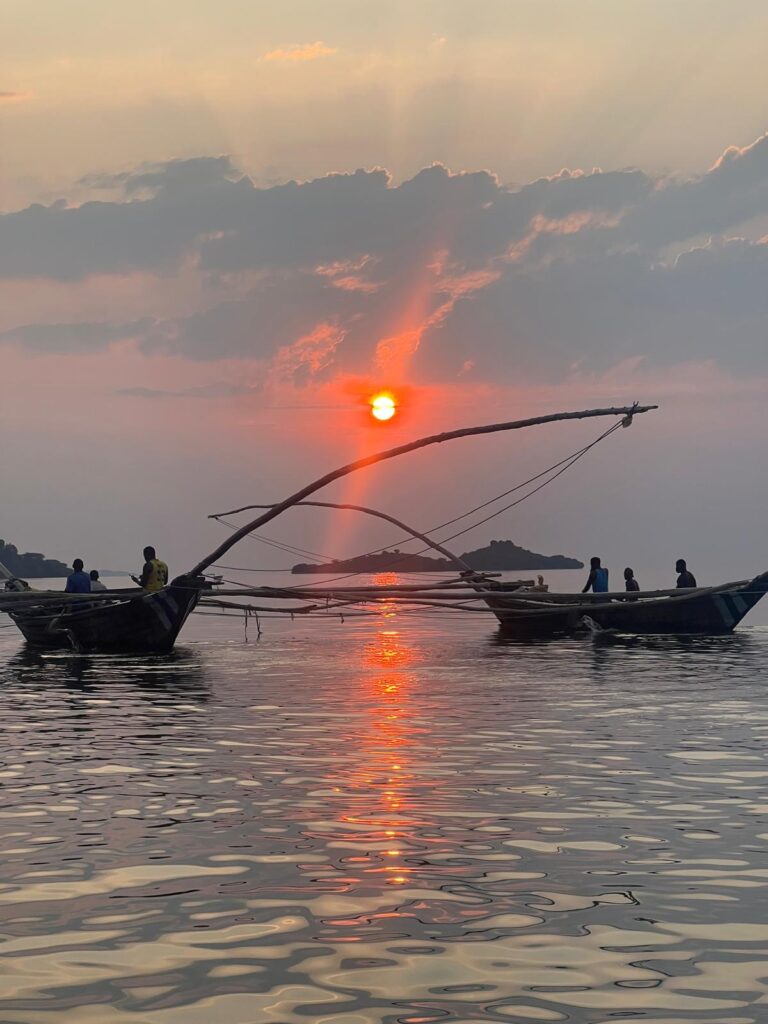Lake Kivu
- Updated: 9 months ago
- By Editorial Team
Lake Kivu: Where Rwanda Meets the Water
There is a hush that lives by the lake—gentler than silence, deeper than quiet. You don’t notice it at first. Not when the boat is still tied to the dock or the motorbike still hums along the mountain road. But as you draw closer to Lake Kivu, something changes. Your shoulders drop. Your thoughts slow. The world softens.
Here in Lake Kivu, the water stretches like glass toward the horizon, broken only by the ripples of wooden canoes or the lazy circle of a pied kingfisher in the sky. The air is sweeter here, touched by minerals from ancient volcanic soil and the warmth of sun-soaked mornings.
Children laugh from the shoreline, their bare feet kicking spray into the sky. Fishermen move like shadows in long wooden boats, their songs drifting across the surface like lullabies.
Lake Kivu isn’t just a destination—it’s a pause and your one stop for a through relaxation after your adventure. A kind of peace you didn’t know you needed until the first wave touches your toes.
Safari Activities on Lake Kivu
A safari by the lake doesn’t involve jeeps or binoculars. It’s slower, more intimate. Here, the adventure is in the rhythm of the water, the heartbeat of the hills, and the quiet encounters that sneak up on you like sunrises.
Start with a boat ride. Early morning is best, when the water is silk and the sky is still brushing out its colors. As you drift from town to bay, islands rise like whispers from the deep. Napoleon Island stands tall in the distance, shaped like the hat of its namesake. Its shores are home to colonies of fruit bats that scatter into the sky at dusk—a soft flurry of wings and wonder.
On land, stroll through coffee plantations tucked into the hills surrounding Kinunu. Here, you can sip beans still warm from the roaster, meet the farmers who hand-pick every cherry, and walk among rows of green leaves that slope toward the water. It’s a kind of safari for the senses—scent, touch, taste.
Kayaking is another quiet thrill. Paddle close to the shore, where kingfishers dart from branches and fishermen smile as they pass. You may glide by a cattle boy singing to his herd, or find yourself pausing just to watch the sunlight glitter in the ripples.
In Kibuye, a visit to the Environmental Museum offers stories of Rwanda’s natural beauty and resilience. Nearby, the Genocide Memorial Church on the hill offers a solemn moment of reflection, where stained glass windows let in the light like soft forgiveness.
And in the evenings, walk. The towns along the lake—Gisenyi, Kibuye, Rutsiro—all have promenades that turn golden at dusk. You’ll hear sandals scuffing the path, the hush of waves, and, sometimes, nothing at all.
When to Visit Lake Kivu
Lake Kivu offers its graceful relaxation breeze all year through, but there are moments when it seems to shine a little brighter.
June to September is Rwanda’s long dry season and during these months bring clear skies, golden hills, and crisp air that wraps around your skin like linen. It’s the perfect time for boat rides, kayaking, and slow walks at twilight. You’ll want to stay outside longer. You’ll want to wake up early, just to watch the sun climb over the lake.
December to February is another dry stretch. The lake is calm, the paths are dry, and the breeze carries the scent of fresh mango and grilled tilapia from beachside cafés. It’s a beautiful time for couples, writers, dreamers. The kind of weather that encourages long talks and late dinners under lantern light.
March to May, and October to November, bring the rains. But don’t let that deter you. Lake Kivu in the rain is something rare—a place where the clouds kiss the hills and the water turns silver. The rains fall softly, like whispered stories, and the world smells of wet earth and eucalyptus. The lake doesn’t close. It listens. And for those who come, it offers a quieter kind of beauty.
Lake Kivu Gallery
Lake Kivu’s Location
Lake Kivu lies in Rwanda’s western arm, tucked against the border with the Democratic Republic of Congo. It is one of Africa’s Great Lakes, stretching over 2,700 square kilometers, and yet it feels intimate—like a secret kept between the hills.
The main towns that dot the lake’s edge—Gisenyi, Kibuye, and Rutsiro—are each reachable within a few hours from Kigali. A scenic drive westward reveals the soul of Rwanda in slow motion: tea plantations, market stalls, roadside chapels, and endless green.
What makes Lake Kivu feel different is the balance. Nature and village life meet here in quiet harmony. You’ll find women weaving on porches, boys skipping stones, and birds singing above the papyrus. There’s no rush. Just rhythm.
History of Lake Kivu
Formed by volcanic activity long ago, Kivu is one of the world’s few lakes that sits above underground gas reserves. Its depths hold methane and carbon dioxide, which Rwanda now uses carefully to generate clean energy—a modern miracle in a lake shaped by ancient fire.
But the stories above the surface are just as powerful.
Kivu was once part of colonial trade routes. Later, during the 1994 Genocide against the Tutsi, it bore witness to unimaginable sorrow. Today, its shores are part of Rwanda’s healing. A place where remembrance lives alongside renewal.
The lake doesn’t erase the past. It reflects it—and helps carry it forward, gently.
Accommodations on Lake Kivu
Where you sleep when in Lake Kivu depends on two simple things: how you want to feel and what you’re happy to spend. The lake moves in slow rhythm—your choice of bed should, too.
In Gisenyi, the Lake Kivu Serena Hotel is a calm jewel on the shore. Think tall palms, wide decks for sunset gazing, and a pool that slips into the water’s edge. Honeymooners pad across cool tiles, children sip fresh juice under umbrellas, and the air smells faintly of jasmine and—what Rwandans call—ibyishimo (pure joy).
Over in Kibuye, Cormoran Lodge balances on wooden stilts. Each chalet opens to a private balcony where dawn paints the lake gold. Wrap your hands around local coffee, listen to gentle waves, and greet the day with a soft “Mwaramutse.” No alarms—just birdsong, light, and the hush of water.
Want a place that feels like family? Paradise Malahide is your lakeside cousin’s home. Simple rooms, sandy paths, and meals cooked with laughter. You might eat barefoot, wave to fishermen drifting past, and feel you belong.
If choosing feels hard, let Friendly Gorillas Safaris guide you. They know every rhythm—luxury, eco-quiet, culture-rich—and match you to a lodge that fits your pace.
Wherever you land, let the lake do its magic. It slows the heart, stills the mind, and reminds you that the best journeys don’t always go far—they go inyuma (deep).
Lake Kivu Frequently Asked Questions (FAQs)
Is Lake Kivu safe for swimming?
Yes. Unlike many African lakes, Lake Kivu is bilharzia-free, which means you can swim safely. The water is warm, clean, and inviting—especially in the afternoons, when the sun has softened your shoulders and all you want is to float.
Can I visit Lake Kivu as a day trip from Kigali?
You can—but it’s better if you don’t. The drive from Kigali to Gisenyi or Kibuye takes around 3 to 4 hours each way. While a day trip is possible, staying at least one night allows you to truly experience the lake’s magic—its sunrises, its evening hush, its quiet conversations.
Is it easy to get around Lake Kivu?
Absolutely. The lake towns link hands like friendly neighbors—by paved road, by winding footpath, and, most delightfully, by water. Hop a local boat between Gisenyi and Kibuye and watch green hills roll past like pages in a storybook, or hire a small pirogue and let the skipper steer you into hidden coves where kingfishers flash blue and white. Prefer wheels? Drivers weave the shoreline road with ease, stopping for smoky roadside brochettes or a quick “Muraho!” at tiny produce stalls. And if you’d rather leave the planning to someone who knows every bend and bay, Friendly Gorillas Safaris will craft transfers, day tours, or multi-stop adventures to match your own gentle tempo.
What should I pack?
Keep it light and easy, like the breeze off the lake. Pack in light clothing for sunny afternoons, a swimsuit for spontaneous dips, and sturdy walking shoes for hillside rambles. Slip a light jacket in for evenings when the air whispers cool and the sky fills with stars. Sunscreen, a hat, and a dab of mosquito repellent will keep you comfortable, while a reusable water bottle spares the planet and keeps you refreshed. And don’t forget a journal—Lake Kivu has a way of stirring quiet thoughts and bright ideas you’ll want to keep long after the waves have settled.
What’s the food like?
Fresh. Local. Comforting. Expect grilled tilapia caught hours before, fried plantains, sweet potatoes, and fresh fruits. Many lodges offer homemade meals, and lakeside cafés serve simple dishes with care. The coffee? Grown just up the hill.
Can I go kayaking or paddleboarding?
Absolutely. Kayaking is one of the best ways to experience the lake—quiet, close, and peaceful. Rentals are available in many lodges, and Friendly Gorillas Safaris can help arrange guided paddle trips that blend nature and narrative.
Why should I include Lake Kivu in my Rwanda safari?
Because every safari needs a pause. After gorillas in the north or chimps in the south, Lake Kivu offers space to rest, reflect, and reconnect—with nature, with your partner, with yourself. It’s not a detour. It’s a destination of the heart.
Conclusion: Where the Water Waits for You
Some places change you with a roar. Others, like Lake Kivu, with a whisper.
It’s in the way the hills lean into the water. The way a fisherman’s song floats into your dreams. The way you stop checking the time because the lake reminds you—this moment is enough.
Let Friendly Gorillas Safaris guide you to the edge of the water, where Rwanda slows its breath and offers you a different kind of journey—not rushed, not loud, but full of light.
Come. Let the lake write its story across your memory. And when you leave, don’t say goodbye. Just say, I’ll be bac










